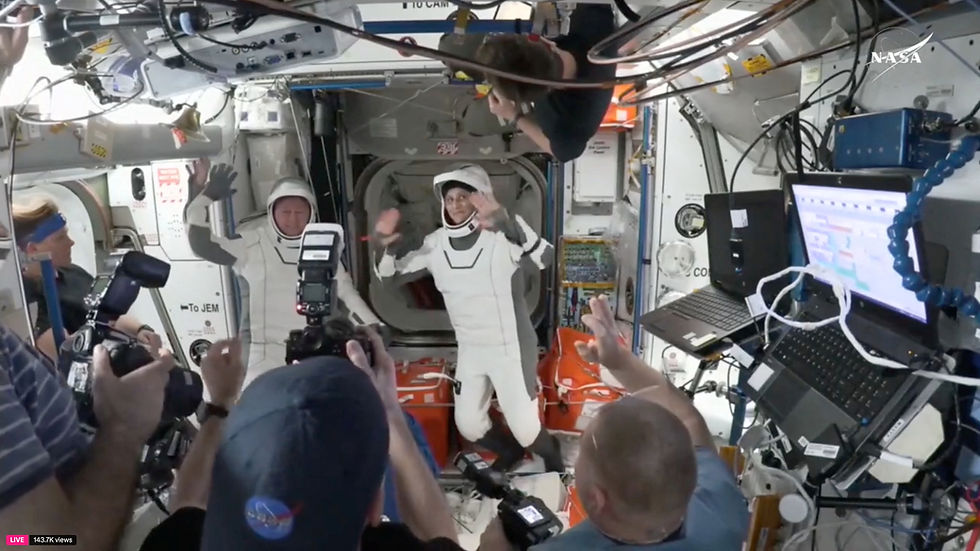Biden looks to relax Cuba sanctions in final days before Trump
- News Agency
- Jan 17
- 4 min read

WASHINGTON/HAVANA -The Biden administration said on Tuesday it would remove Cuba from its terrorism blacklist, while Cuba said separately it would release upward of 500 prisoners from its jails, dual announcements poised to reshape U.S.-Cuba relations just days before Donald Trump takes office.
President Joe Biden's announcements effectively roll back many of the sanctions put in place by President-elect Trump during his previous term ending in 2021. If they endure, they would represent the most significant advance in U.S.-Cuba relations since the Obama-era detente.
Trump, a harsh Cuba critic who designated the island a state sponsor of terrorism - has not yet commented on the measures but has promised a hard line on the communist-run country. He also nominated U.S. Senator Marco Rubio, the son of immigrants from Cuba and an outspoken critic of the island's government, as secretary of state.
Biden's announced plans - subject to the review of Congress, and the incoming Trump administration - would lift Trump's 2021 designation of Cuba as a state sponsor of terrorism, easing sanctions on an island already suffering a deep economic crisis.
They would also revoke a 2017 Trump order that restricted financial transactions with some military- and government-linked Cuban entities, according to a senior administration official.
Biden also seeks to prevent individuals from filing lawsuits against both Cuban entities and foreign companies under the Helms-Burton Act over property seized following Fidel Castro's 1959 revolution, the official said.
Just one hour after the U.S. announcement, Cuban President Miguel Diaz-Canel announced his government planned to "gradually" release 553 prisoners following talks with Pope Francis.
Cuba faced sharp criticism from rights groups, the United States and the European Union following the imprisonment of hundreds of protesters after riots on July 11, 2021, the largest since Castro's revolution.
It was not immediately clear whether the prisoners to be released had been detained following those protests.
A Cuban foreign ministry statement said the decision reflected the "humanitarian nature of the Cuban justice system" but did not tie the prisoner release to the Biden announcements.
Cuba's government called the breakthrough a step in the "right direction," but accused the U.S. of continued "economic warfare" against the island, warning that the measures could be quickly rolled back and that the Cold War-era U.S. trade embargo against Cuba remained.
Trump, who takes office on Jan. 20, may seek to revive the sanctions overturned by Biden once in office.
U.S. Congressman Mike Waltz, Trump's national security adviser, celebrated the release of political prisoners and suggested that Biden's steps could be rolled back.
"Anything that they're doing right now we can do back, and no one should be under any illusion in terms of a change in Cuba policy," Waltz told Fox News.
Trump's transition team and Rubio's Senate office did not respond to a request for comment.
A U.S. official said Biden and Trump's teams had "been in communication" on the topic.
In a brief letter to Congress, Biden said the actions announced on Tuesday were "necessary to the national interests of the United States and will expedite a transition to democracy in Cuba."
PRISONER RELEASE
Cuba has been discussing the possibility of a prisoner amnesty with Vatican officials since at least 2023.
The Vatican has proved the linchpin in prior negotiations to release prisoners from the island's jails. It also helped broker the historic resumption of ties between Cuba and the United States in 2015 under former President Barack Obama.
"There is broad bipartisan support from both parties and certainly both administrations that people in Cuba should not be unjustly detained," a senior Biden official said on Tuesday.
Cuba maintains that those imprisoned following the 2021 protests had committed crimes ranging from vandalism to sedition.
In the short term, Biden's new measures were expected to give Havana more space to maneuver as it battles the crippling economic crisis.
Shortages of food, fuel, medicine and electricity in Cuba have stoked a record-breaking exodus off the island. At least 1 million Cubans have left by land and sea since 2020, many for the United States, where they contribute to the crisis at the U.S. border.
Trump placed Cuba on the U.S. State Sponsor of Terrorism list in 2021 in the final hours of his first term, saying Havana had repeatedly provided "support for acts of international terrorism" by harboring U.S. fugitives and Colombian rebel leaders.
Cuba denied the allegations, calling the designation a farce and seeking removal from the list, which carries a prohibition on U.S. economic aid and a ban on U.S. arms exports.
Biden officials said a recent review of Cuba's inclusion on the list had formed the foundation for their decision.
"In our review, what we found is that there is no credible evidence at this time of ongoing support by Cuba for international terrorism," said one of the U.S. officials.
(Reporting by Trevor Hunnicutt, Doina Chiacu and Susan Heavey in Washington and Dave Sherwood in Havana; Editing by Christian Plumb, Matthew Lewis and Kim Coghill)









.png)








Comments